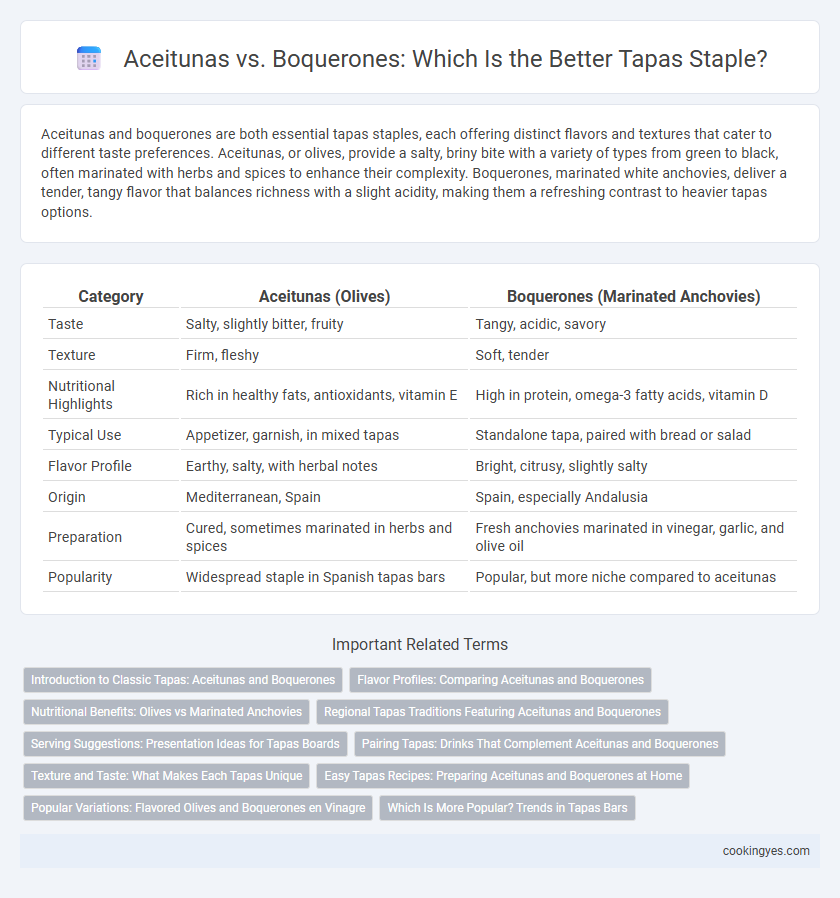Aceitunas and boquerones are both essential tapas staples, each offering distinct flavors and textures that cater to different taste preferences. Aceitunas, or olives, provide a salty, briny bite with a variety of types from green to black, often marinated with herbs and spices to enhance their complexity. Boquerones, marinated white anchovies, deliver a tender, tangy flavor that balances richness with a slight acidity, making them a refreshing contrast to heavier tapas options.
Table of Comparison
| Category | Aceitunas (Olives) | Boquerones (Marinated Anchovies) |
|---|---|---|
| Taste | Salty, slightly bitter, fruity | Tangy, acidic, savory |
| Texture | Firm, fleshy | Soft, tender |
| Nutritional Highlights | Rich in healthy fats, antioxidants, vitamin E | High in protein, omega-3 fatty acids, vitamin D |
| Typical Use | Appetizer, garnish, in mixed tapas | Standalone tapa, paired with bread or salad |
| Flavor Profile | Earthy, salty, with herbal notes | Bright, citrusy, slightly salty |
| Origin | Mediterranean, Spain | Spain, especially Andalusia |
| Preparation | Cured, sometimes marinated in herbs and spices | Fresh anchovies marinated in vinegar, garlic, and olive oil |
| Popularity | Widespread staple in Spanish tapas bars | Popular, but more niche compared to aceitunas |
Introduction to Classic Tapas: Aceitunas and Boquerones
Aceitunas are cured olives often marinated with herbs and spices, delivering a rich, briny flavor that complements traditional Spanish tapas. Boquerones consist of fresh anchovies marinated in vinegar and garlic, offering a tender texture and tangy, savory taste essential to coastal tapas dishes. Both ingredients are staple elements in classic Spanish tapas, celebrated for their distinct flavors that enhance shared dining experiences.
Flavor Profiles: Comparing Aceitunas and Boquerones
Aceitunas offer a rich, briny flavor that varies from mild and buttery to sharp and bitter, depending on the variety, making them a versatile staple in tapas. Boquerones provide a tangy and slightly sweet taste with a tender texture, enhanced by marination in vinegar and herbs, creating a refreshing contrast to the saltiness of aceitunas. The interplay between the salty, savory notes of aceitunas and the bright, acidic profile of boquerones highlights their complementary roles in traditional Spanish tapas.
Nutritional Benefits: Olives vs Marinated Anchovies
Aceitunas provide a rich source of healthy monounsaturated fats, vitamin E, and antioxidants that support heart health and reduce inflammation. Boquerones offer high-quality protein, omega-3 fatty acids, and essential minerals like calcium and selenium, promoting brain function and reducing cardiovascular risk. Both tapas staples deliver unique nutritional benefits, making them complementary choices for a balanced Mediterranean diet.
Regional Tapas Traditions Featuring Aceitunas and Boquerones
Aceitunas and boquerones are iconic staples in regional tapas traditions across Spain, each reflecting distinct local flavors and culinary heritage. In Andalusia, boquerones--marinated white anchovies--are favored for their tangy, fresh taste, often served with garlic and olive oil, while in regions like Extremadura and Catalonia, aceitunas offer a rich variety of olives that highlight the area's agricultural prowess. Both ingredients epitomize the cultural significance of tapas, showcasing the diversity of Spanish coastal and inland gastronomy through simple yet flavorful bites.
Serving Suggestions: Presentation Ideas for Tapas Boards
Aceitunas, or marinated olives, pair beautifully with citrus zest and fresh herbs like rosemary or thyme, offering a vibrant, aromatic contrast on tapas boards. Boquerones, lightly pickled anchovies, shine when arranged atop crusty bread with a drizzle of high-quality olive oil and a sprinkle of sea salt, delivering a delicate and tangy bite. Combining both with complementary accompaniments such as Manchego cheese, roasted almonds, and sun-dried tomatoes enhances the visual appeal and flavor complexity of traditional Spanish tapas presentations.
Pairing Tapas: Drinks That Complement Aceitunas and Boquerones
Aceitunas, with their briny, rich flavors, pair exceptionally well with dry sherries like Fino or Manzanilla, enhancing their salty complexity. Boquerones, marinated anchovies with a tangy bite, are perfectly balanced by crisp, acidic white wines such as Albarino or Verdejo, which cut through the oiliness. Both tapas staples elevate the drinking experience by complementing the unique taste profiles of traditional Spanish wines and beers.
Texture and Taste: What Makes Each Tapas Unique
Aceitunas offer a firm, briny texture with a slightly bitter and salty taste that provides a satisfying contrast in tapas selections. Boquerones feature a tender, marinated white anchovy flesh with a delicate, tangy flavor profile enhanced by vinegar and garlic, creating a distinct freshness. The interplay of Aceitunas' robustness and Boquerones' light acidity defines their unique roles as essential tapas staples.
Easy Tapas Recipes: Preparing Aceitunas and Boquerones at Home
Aceitunas and boquerones stand out as essential staples in easy tapas recipes, offering distinct flavors and textures that elevate any spread. Preparing aceitunas involves marinating olives in a simple mix of olive oil, garlic, herbs, and sometimes chili, creating a savory and aromatic bite. Boquerones require curing fresh anchovies in vinegar, garlic, and parsley, producing a tangy and tender tapa perfect for quick, homemade appetizers.
Popular Variations: Flavored Olives and Boquerones en Vinagre
Aceitunas, or flavored olives, are a tapas staple often infused with herbs like rosemary, garlic, and citrus zest to enhance their rich, briny flavor profile, making them a versatile appetizer across Spanish regions. Boquerones en vinagre, marinated white anchovies in vinegar, offer a tangy, tender alternative commonly seasoned with garlic and parsley, prized for their delicate texture and bright, acidic finish. Both variations highlight the diversity in Spanish tapas, with aceitunas providing a robust, savory bite and boquerones en vinagre delivering a refreshing, seafood-centric contrast.
Which Is More Popular? Trends in Tapas Bars
Aceitunas remain more popular than boquerones in tapas bars across Spain, with olives favored for their versatility and variety, such as Manzanilla and Gordal. Trends show a steady demand for boquerones, particularly marinated anchovies, gaining niche popularity in coastal regions where fresh seafood is prized. Data from hospitality surveys reveal aceitunas dominate 65% of tapas orders, reflecting their classic status, while boquerones account for approximately 25%, indicating a growing, though secondary, preference.
Aceitunas vs Boquerones for tapas staples Infographic

 cookingyes.com
cookingyes.com